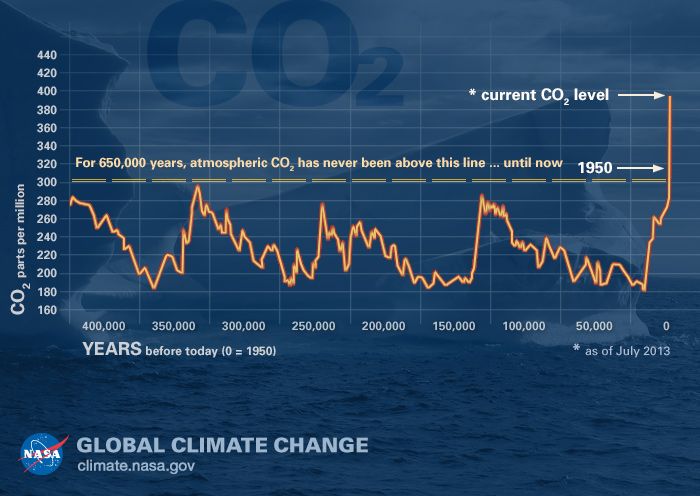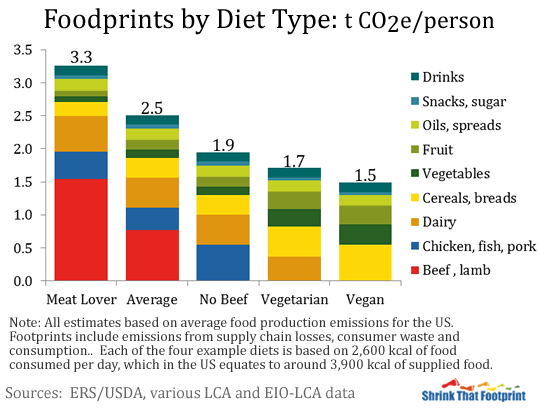 Guest Article by Gesina Beckert Image: Gesina Beckert lifting the heavy beef burger at the Facebook Farmers Market We are experiencing record high levels of carbon dioxide (CO2) in the atmosphere. They are higher than they have been at any time in the past 400,000 years. In this paper, I am going to explore how the burger, and other parts of our lifestyle impact our climate. Understanding is the first step to changing behavior towards a lower personal CO2 footprint. We can all do something to make our world a better place. CO2 Emissions Thanks to the world bank, data about the CO2 emissions per country per capita (basically per person) is available for everyone. To show some numbers, I selected the highest, and the lowest CO2 emissions, and as I currently live in the US, but I am a native German, these countries are also included. On average carbon emissions have increased slightly over the last years. Several reasons such as increasing levels of wealth resulting in higher consumption of products, growing number of cars, ships, planes, more production, connectivity; are responsible for the increase. Our lives depend on electricity, fossil fuels, and mass (meat) production! Everything needs power. Take a moment to look around. Most likely you see your phone, you are on your computer, your car is parked outside, you might have the AC turned on, and you already dream about this next burger. All this is increasing CO2 emissions.  Figure 2: CO2 emissions per person in 2011 http://data.worldbank.org/indicator/EN.ATM.CO2E.PC Figure 2: CO2 emissions per person in 2011 http://data.worldbank.org/indicator/EN.ATM.CO2E.PC The table above shows that the average emissions per person in the US is almost twice the amount of the average German. Some explanations can be found in Germans driving smaller cars, building houses with better insulation which reduces heating and AC needs, eating less beef in the diet, smaller and more efficient household appliances etc. In all countries, no matter what the baseline, there is room for improvement and it is possible - other countries are already there and are still trying to get better. We are all in the same boat here! The diet One very effective, and rather easy step to reduce your carbon footprint is analyzing your diet, and adjusting it. Recently I read an article that compared five different diets to each other. And if there is one thing I will remember, it will be this: beef is the single biggest contributor to carbon emissions. "Eating chicken instead of beef cuts a quarter of emissions in one simple step" While the average American diet has a carbon footprint of 2.5 t per year, cutting beef consumption reduces this amount significantly to 1.9 t CO2 per year. Another factor encouraging a diet with less meat is that your general health level will improve with a balanced diet consisting of more veggies, fruits and white meats.
This research made me question if buying organic food can reduce this even more. Some first articles seem to justify that, others argue that there is no real difference between traditional and organic farming. This topic would be a whole new one, so I leave it for now. Remember the less beef advice :) Learning about climate change, and carbon footprint, and different carbon weights of diet is one way, but our mind really understands best, when more our senses are involved too. My partner in carbon footprint reductions, Tom Kabat, and I came up with an easy way to demonstrate the impacts of different kinds of food. Everyone knows fast food hamburgers. In fact Americans approximately consume 50 billion burgers a year!!! Now considering that every burger contains a quarter pound of beef, the carbon footprint is 17 times as much as the burger weight. Yes, that’s right, every burger adds 7 lbs of carbon to your footprint. 50 billion burgers mean 850 billion lbs of CO2 emissions per year in the US from burgers alone. http://www.pbs.org/newshour/rundown/the-hidden-costs-of-hamburgers/ That’s the bad news. The good news is that there is an easy way out. Every day, every meal, you have the choice to decide what you want to eat. A chicken burger adds only 2 lbs, while the Veggie burger with 1 lb is the lightest for the earth, and for your body, too. Choosing chicken instead of beef, leaving meat out for day or more out of your diet will make a huge impact on your carbon footprint, and on your health, and on your figure, and eventually on the US, and the worlds carbon footprint. Thank you! Let me know what you think about the burger and the climate. [email protected] Comments are closed.
|




